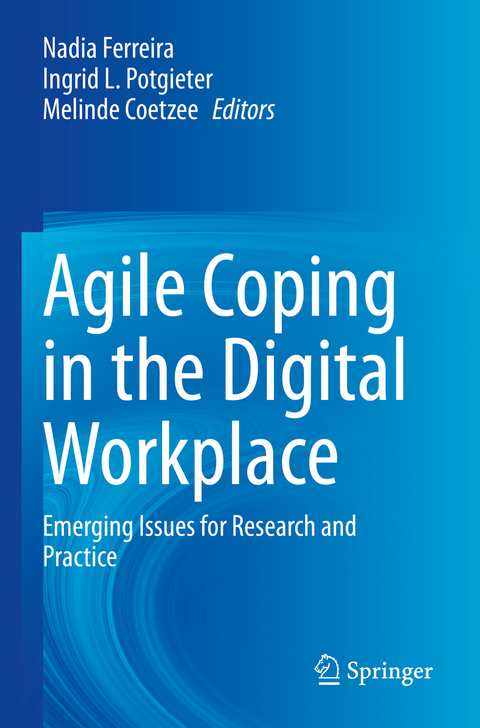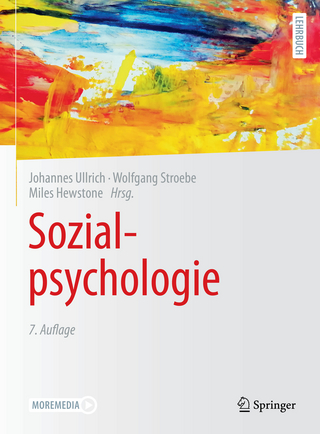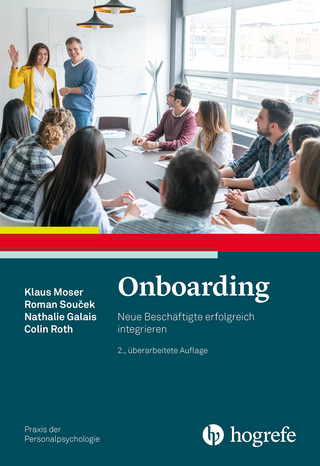
Agile Coping in the Digital Workplace
Springer International Publishing (Verlag)
978-3-030-70230-4 (ISBN)
This volume outlines emerging issues for research and practice related to agile coping dynamics in the digital era. Chapters in this book report on current research on the key constructs and processes underlying coping dynamics in multi-disciplinary domains and across the life-span. Chapters compare current research trends in terms of future potential directions for research on coping dynamics in the digital era. The book also critically evaluates the relevance, applicability and utility of the research findings and theoretical premises in various classical, current and potential emerging issues for research and practice in the smart digital technological world of work for employee across their careers.
Among the topics discussed:
- The digital era: contextual issues and coping
- Issues for organizational practice
- Issues for individuals
- Coping within the employability context
Agile Coping in the Digital Era provides theoretical premises and research perspectives, while also evaluating the practical utility of theory and research ideas for management and employee practices in Industry 4.0 organizational contexts.
lt;p> Nadia Ferreira is an Associate Professor in Human Resource Management at the Department of Human Resource Management at UNISA. She is a registered human resource practitioner with the South African Board for People Practices (SABPP). Nadia Ferreira completed her MCom degree in Human Resource Management and Industrial Psychology in 2008 at the University of Pretoria. She completed her DCom Industrial Psychology degree at Unisa in 2012. She is also an author and co-author of several published articles in local and international journals. In addition, she presented several papers at national and international conferences. Nadia Ferreira is a section editor for the South African Journal of Industrial and Organisational Psychology
Ingrid L. Potgieter (DCom) is an Associate Professor in Human Resource Management at the Department of Human Resource Management at UNISA. She is a registered industrial psychologist at the Health Professions Council of South Africa (HPCSA) since 2009 and also a registered human resource practitioner and the South African board for people practices (SABPP). Ingrid Potgieter completed her Mcom degree in Human Resource Management and Industrial Psychology in 2009 at the University of Pretoria. She completed her Dcom Industrial Psychology degree at Unisa in 2012. She is also an author and co-author of several published articles in local and international journals. She presented several papers at national and international conferences. Ingrid Potgieter is a section editor for the South African Journal of Industrial Psychology and edited and co-edited a number of scholarly books published by an international publisher.
Melinde Coetzee (DLitt et Phil) is a professor in the Department of Industrial and Organisational Psychology at the University of South Africa, Pretoria, South Africa. She has extensive experience in the corporate environment on psychological interventions pertaining to organisational development, human capacity and career development, and talent retention. Her research interests include issues of employability and career and retention psychology in multi-cultural work contexts. She served in the role of Chief Editor of the South African Journal of Industrial Psychology (2014 to 2019). She has published in numerous accredited academic journals. She has also edited, co-authored and contributed subject matter chapters to books nationally and internationally. She has presented numerous academic papers and posters at national and international conferences. She is a professionally registered Psychologist (cat. Industrial) with the Health Professions Council of South Africa (HPCSA) and a master human resource practitioner with the South African Board for People Practice (SABPP). She is a member of SIOPSA. EAWOP and IAAP
Chapter 1: Introduction.- Section I: The digital era: contextual issues and coping.- Chapter 2.- Chapter 3.- Section II: Managing coping within the digital era: issues for organisational practice.- Chapter 4.- Chapter 5.- Chapter 6.- Chapter 7.- Chapter 8.- Chapter 9.- Chapter 10.- Section III: Managing coping within the digital era: issues for individuals.- Chapter 11.- Chapter 12.- Chapter 13.- Chapter 14.- Chapter 15.- Section IV: Addressing coping within the employability context.- Chapter 16.- Section IV: Integration and conclusion.- Chapter 17.
| Erscheinungsdatum | 23.05.2022 |
|---|---|
| Zusatzinfo | XVI, 328 p. 13 illus., 11 illus. in color. |
| Verlagsort | Cham |
| Sprache | englisch |
| Maße | 155 x 235 mm |
| Gewicht | 528 g |
| Themenwelt | Geisteswissenschaften ► Psychologie ► Arbeits- und Organisationspsychologie |
| Geisteswissenschaften ► Psychologie ► Sozialpsychologie | |
| Medizin / Pharmazie ► Medizinische Fachgebiete ► Psychiatrie / Psychotherapie | |
| Wirtschaft ► Betriebswirtschaft / Management ► Personalwesen | |
| Schlagworte | agile coping • Applied Psychology • Artificial Intelligence • Coping • coping with the digital era • Employability • employee behavior • Human Resource Management • industrial and organizational psychology • Industry 4.0 • Organizational Behavior • organizational interventions • positive coping mechanisms • Technological Change • Work design |
| ISBN-10 | 3-030-70230-8 / 3030702308 |
| ISBN-13 | 978-3-030-70230-4 / 9783030702304 |
| Zustand | Neuware |
| Haben Sie eine Frage zum Produkt? |
aus dem Bereich


